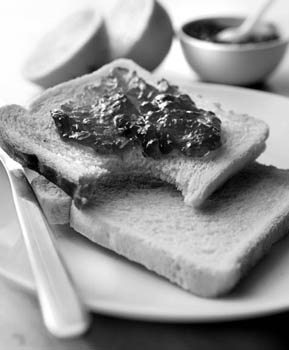Soul Food
Marmalade, Sloe Gin, and the Fruits of a Santa Barbara Upbringing

It’s almost orange season again (I measure time by the fruits that come tumbling from trees). We always have more oranges than we know what to do with. By season’s end, we inevitably are carting them away by the bagful to friends who pretend to be grateful, but who, I suspect, are tiring of our citrus generosity. Everything starts to smell of blossom, and after I’ve peeled a particularly juicy Navel, I put my face close to my palms and breathe in the fragrance.
In my childhood-an era not so long ago-characterized by dirty fingernails, tangled hair, horses, and violin lessons on the Santa Barbara Riviera, we had an apple tree. One year, its branches sagged, it shrugged, and it said, “No more, I’m weary” and never again dropped a fruit. But every apple I bite into, I compare to those that it bore.
Grapefruits come in sour, pinkish-yellow packages, looking like sunrise. The white peaches of springtime, carried by bucket up to the house, are the sweetest I have ever known. And, of course, the oranges in winter, a blush of color upon dark branches.
In Santa Barbara, I used to wander the stalls of the Tuesday Farmers Market on State Street. I remember buying tomatoes from my best friend’s father. When we were little, his daughter and I picked plums right from the tree and sat for hours on the floor of their house with a crate of tangerines at our elbows, popping little fruits into our mouths while a wall of peels built up around us. We were wild children, with grubby hands and a love for things whose origins we could see: the artichokes at dinner, the avocados we spread on toast every morning. What vegetable does not taste sweeter when you have galloped through a field of it on a runaway mare?
This past October, I traveled to England, where I will shortly be relocating. On the last day of my trip, my boyfriend, Xander, and I went to his parents’ house where we were whisked away at once by his mother, who gave me an oversized fleece and breathlessly proclaimed: “We’re going to pick sloe berries!”
I didn’t know what sloe berries were, though I’d tasted some very nice sloe vodka once (sweet and heavy, like drinking straight from the center of a fruit, and dangerous in any great quantity). We pulled over on the side of the road, in rubber boots, armed with Tupperware containers, and forayed into a nearby field. Sloes, it turns out, look an awful lot like blueberries: small purple fruits that hide behind brambles and in hedges.
We picked enough for “three or four bottles of sloe gin”-to be distributed at Christmastime-which took most of the afternoon. Dinner was a sleepy affair, each of us nursing scratches and sniffling a little from the cold. I found myself telling Xander and his family about the oranges.
“We should make marmalade,” Xander responded simply, when I said how there always end up being too many of the fruit. So, for the first time ever, we shall make marmalade, and attempt to put in a jar the feeling of winter-to be consumed, perhaps, in the hot, dry months of summer, when all trace of orange blossom has faded from my hands.
In 1956, E.B. White wrote: “Perhaps success in the future will depend partly on our ability to generate cheap power, but I think it will depend to a greater extent on our ability to resist a technological formula that is sterile: peas without pageantry, corn without coon, knowledge without wisdom, kitchens without a warm stove.” I’m inclined to agree. What good are peas without pageantry? What happiness to be found in fruit without history? As a child, even lettuce held excitement, because I knew what it looked like before it was ready to be eaten. As an adult, I find myself telling the stories of the food I’ve cooked at dinner parties: This lasagna, I say one lazy afternoon, and embark on a monologue about the man who sold me the fresh pasta, and the story of how I came to acquire the aubergine from a shop that smelled like the streets of a Moroccan city.
So I think, perhaps, that I’d like to go on resisting a technological formula that is sterile. I’d like to beat on, so that I can always measure the seasons as much by taste as by light and temperature, so that I sustain not only my body, but my spirits as well, and so that, sometime this June, when Xander and I are back in England, as I am missing the place where I grew up, we can taste our marmalade, and sip our sloe gin, and remember ourselves.



